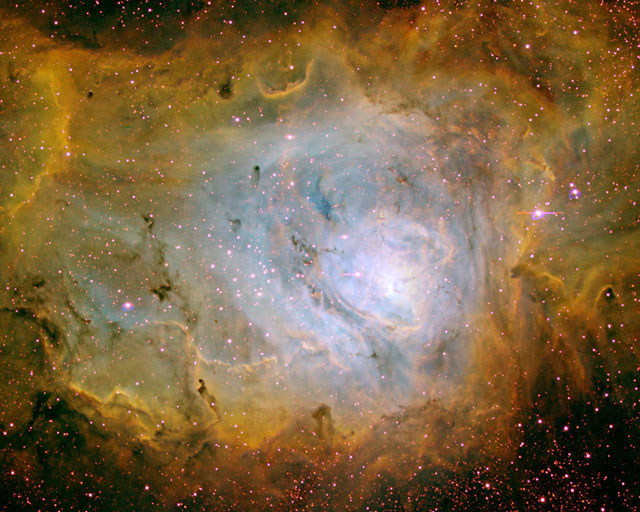Explanation: The bright Lagoon Nebula is home to a diverse array of astronomical objects. Particularly interesting sources include a bright open cluster of stars and several energetic star-forming regions. When viewed by eye, cluster light is dominated by an overall red glow that is caused by luminous hydrogen gas, while the dark filaments are caused by absorption by dense lanes of dust. The above picture, from the Curtis-Schmidt Telescope, however, shows the nebula's emission in three exact colors specifically emitted by hydrogen, oxygen, and sulfur. The Lagoon Nebula, also known as M8 and NGC 6523, lies about 5000 light-years away. The Lagoon Nebula can be located with binoculars in the constellation of Sagittarius spanning a region over three times the diameter of a full Moon.
1999 2000 2001 2002 2003 2004 2005 2006 2007 2008 2009 2010 2011 2012 2013 2014 2015 2016 2017 2018 2019 2020 2021 2022 2023 2024 2025 |
Январь Февраль Март Апрель Май Июнь Июль Август Сентябрь Октябрь Ноябрь Декабрь |
NASA Web Site Statements, Warnings, and Disclaimers
NASA Official: Jay Norris. Specific rights apply.
A service of: LHEA at NASA / GSFC
& Michigan Tech. U.
|
Публикации с ключевыми словами:
M 8 - Lagoon Nebula - emission nebula - эмиссионная туманность - Туманность Лагуна
Публикации со словами: M 8 - Lagoon Nebula - emission nebula - эмиссионная туманность - Туманность Лагуна | |
См. также:
Все публикации на ту же тему >> | |
